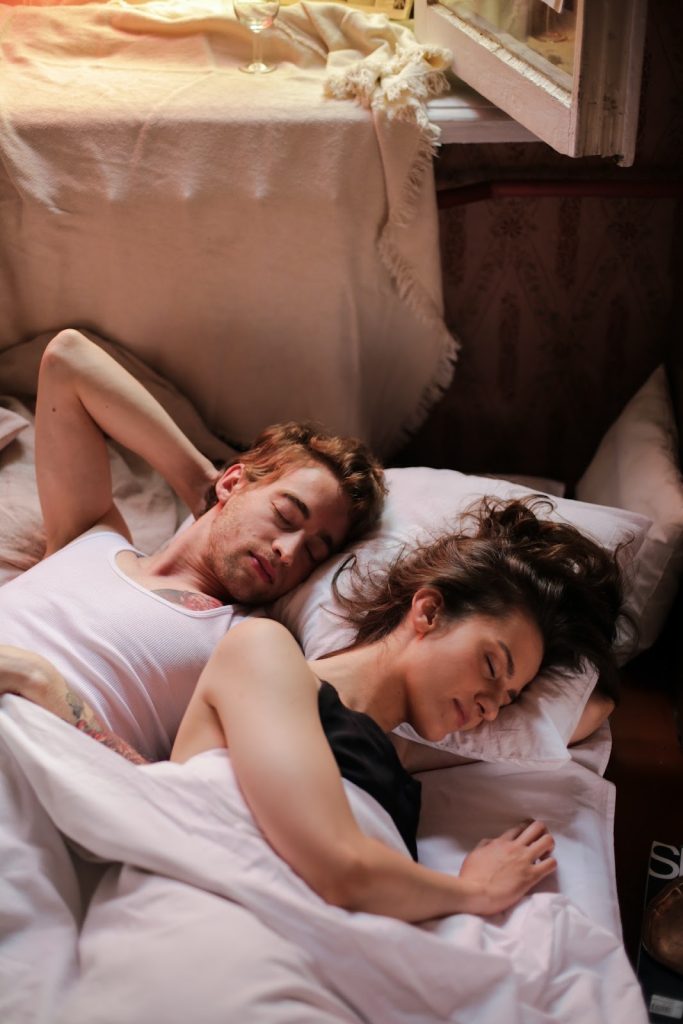Trying to get enough sleep when you’re suffering from anxiety is tough. Your body is exhausted, but your mind remains wide awake and you can feel your heart racing, which is why you can’t fall asleep. Then, when you do, you’re awoken suddenly by a dreadful thought or panic attack and you’re back to square one. It’s common for people to suffer more with anxiety at night time because there are less things around you to distract you, and if you’re looking for some tips on how to get more sleep, then you’ve come to the right place! Here are some tried and tested methods of getting more sleep when you’re feeling anxious at night.
Buy a white noise machine
Quite often anxiety can appear at night due to fears or worries that creep up on you when everything goes quiet and you’re lying in the dark. To help eliminate this stage and triggering your anxiety, consider buying a white noise machine to help soothe your mind into a restful sleep. This trick is often used on babies, and is a great method for blocking out any unwanted sounds – like traffic outside – and can even help your mind relax. If your anxieties stem from a fear of darkness, then you can buy a white noise machine fitted with a relaxing light to help you drift off into a peaceful sleep.
Slow down your breathing
One of the most common symptoms of anxiety is shortness of breath, and this is because your heart rate has increased and your body reacts by taking shorter and sharper breaths. Slowing down your heart rate will help your breathing return to normal and therefore; help you fall asleep. A great way of doing this is using a technique called ‘grounding’. Sit up in bed, put one foot on the floor, and identify something you can see, hear, smell, touch, and taste. This technique can help ‘ground’ you when you’re in the middle of a panic attack.
If you experience breathing problems on a regular basis, it might be worth checking out Wellue Health Blog and their respiratory section to learn more about what could be causing shallow breathing, even if you’re not feeling anxious. Of course, if you’re struggling to breathe, speak to your GP as soon as possible.
Write down your worries
Another reason you might be feeling anxious at night is that you have a lot of things on your mind. Perhaps you’re having a tough time at work, or you’re worried about a family member or friend. Whatever your worries are, try writing them down before bedtime. This method has previously helped many people feeling like a weight has been lifted and allows them to fall asleep naturally. This method is also extremely helpful if you’re worried about not remembering something important the following day – write it all down before bedtime!
Try hypnosis
Hypnosis is a proven method of changing the mindset, and it can be a really useful tool to use for anxiety too. There are many free anxiety hypnosis apps that you could download directly to your phone. When you’re comfortable in bed, pop in some headphones that you can sleep in (if you don’t want to disturb your loved one) and play the tape. Some people have even commented saying they’ve never made it to the end of a hypnosis tape because they’ve fallen asleep during the tape, but it doesn’t matter if you don’t. Listen to hypnosis tapes to help distract your mind, and subconsciously learn how to control your anxiety. Don’t knock it until you’ve tried it!
Get out of bed for a while
Being unable to sleep is horrible enough in itself, and if you’re feeling anxious on top of it and nothing is working, it’s best to get out of bed for a while. Do something you love such as play a computer game, read a book or even bake some cookies! When your mind begins to feel tired, head back to bed and try again. Staying in bed will only cause you to become more frustrated!
Avoid alcohol and smoking
While there’s nothing wrong with having an alcoholic drink, drinking too close to bedtime can trigger anxiety or make it worse. If you fancy a glass of your favorite tipple, be sure to have it at least two hours before bedtime, and drink water before you get into bed to avoid any adverse effects. Smoking can do the same thing, especially when it comes to feeling breathless. Quit smoking now not just for your anxiety, but for your general health.
Look at your diet
Much like alcohol and smoking, the foods you’re eating can have a negative effect on your anxiety. Did you know that junk food can cause a chemical imbalance in the brain? When this happens, your mind begins to change and this can lead to anxiety and/or depression. Try and eat a healthy, balanced diet and get proper vitamins to eliminate your nighttime anxiety and improve your general health.
Eliminate stress from your life
Everyone experiences stress at some point in their life, some more than others. However, one’s ability to handle stress is completely different, and if you feel like the world is on your shoulders, it’s no surprise you’re feeling anxious! Take the time to eliminate as much stress as you can out of your life, even if that means finding a new job or moving home! Your mind and body will thank you in the long run for the sleep and happier person overall.
Distract yourself
Anxiety at night is awful because you’re unable to do the thing you went to bed for – sleep! However, because you’re in a quiet and darkroom, you may find the feelings of anxiety worse and in this situation, one of the best things you can do is distract yourself! Pop your television on a timer to switch off in a few hours, and put on a film or tv show that you love on quietly to distract yourself. Alternatively, pick up a book and immerse yourself in a good story to help distract your mind from your anxiety. You’ll soon begin to feel tired and fall asleep without anxiety breathing down your neck.
Turn off devices
Devices such as phones and tablets have a blue light that can actually prevent you from falling asleep, anxiety or not. Turn off or put out of reach your devices to help your eyes relax and fall asleep. If you’re in need of a distraction, still try and avoid picking up your phone and try the methods above first.

Anxiety can be difficult for both you and your partner, as they may feel helpless when you’re feeling anxious, and they may also lose sleep too! Talk to your loved one about your feelings, no matter how insignificant they may seem. This can help them understand why you’re feeling anxious, and you may be surprised at how much talking about it can help, especially to someone you love and trust.
Speak to your GP
If anxiety is becoming a problem that you’re experiencing every night or even more frequently than that, then you should tell your GP about what you’ve been experiencing. They will be able to give you a multitude of options that will help you remain calm, learn how to control your anxiety, and most importantly, get more sleep at night.
Create a bedtime routine
Creating a bedtime routine gives your mind and your body time to relax before getting into bed. Try having a bath, drinking warm tea, getting into your pajamas and doing something quiet such as reading or knitting. This will help keep your mind calm and relax you enough to fall asleep much easier when it comes to getting into bed. It may take some experimentation, but once you’ve found a routine that works for you, be sure that you do this every night to help get more sleep and eliminate anxiety.
Go to bed earlier
One of the worst things about anxiety is that sometimes it can keep you awake for hours and hours, and then you’re left with a mere few hours of rest once you’ve managed to fall asleep. Going to bed earlier means that even if you do have to battle with anxiety for a while, you’re more likely to get enough sleep and wake up feeling refreshed. Did you know that tiredness can also contribute to anxiety? Try going to bed earlier for more sleep!
Don’t torture yourself
Finally, when you really can’t sleep, it’s only natural to look at the clock and work out how much time you’d be asleep if you fell asleep right that second. Don’t do this! If needs be, remove or turn around any clocks in your bedroom and try all of the above tips to help fall into a natural and restful sleep.
As you can see, there are a plethora of ways to get more sleep when you feel anxious at night!
Dealing with any type of disorder is a struggle, but when you have to fight two of them at the same time, it gets even harder. The most important thing is to try to remain reasonable and patient and get the help you need to overcome these problems.
Alaska Sleep Clinic is the only lab in Alaska with a psychologist that specializes in sleep disorders. Read more about Dr. Angie Randazzo .











